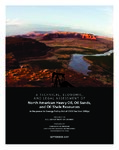TO
1 - 25 of 14
| Title | Date | Subject | Description | ||
|---|---|---|---|---|---|
| 1 |
 |
2012 Unconventional fuels conference introduction | 2012-05-15 | unconventional fuels; computational simulation and pilot-scale experiment; unconventional resources; emissions minimization; CO2 regulation; CO2 coal research | Presentation given at the 2012 Unconventional Fuels Conference. |
| 2 |
 |
Welcome and Introduction: 2009 Western U.S. Oil Sands Conference | 2009-02-27 | oil sands industry; industrial combustion; gasification technology research; CO2 capture technologies; coal; OxyFuel Combustion; chemical looping; gasification; oil shale/sands | Summary of challenges facing U.S. oil sands industry and the role of the Institute for Clean and Secure Energy at the University of Utah in addressing those challenges, presented at the 2009 Western U.S. Oil Sands Conference by Philip Smith, Professor, Department of Chemical Engineering and Director... |
| 3 |
 |
A technical, economic, and legal assessment of North American heavy oil, oil sands, and oil shale resources: In response to Energy Policy Act of 2005 Section 369(p) | 2007-09 | Oil sands; Oil shale; Heavy oil; Energy Policy Act; 2005; Climate Change; Petroleum; Oil Cost; United States; North American heavy oil; Utah Heavy Oil Program; UHOP; World economic development; Energy; Canadian oil sands; Unconventional resources ;Technical; Economic; Legal assessment | Against the backdrop of world population growth, rapid economic expansion in the world's most populous countries, challenging political climates in many oil-producing nations, and the specter of climate change, worldwide energy consumption is projected to increase from the 2004 level of just over 40... |
| 4 |
 |
STAR-CCM+ simulations of in-situ thermal treatment of oil shale | 2013-03 | in-situ thermal treatment; oil shale; shale oil/gas; oil shale formations | Presentation given at the STAR Global Conference on March 13, 2013. |
| 5 |
 |
Lands with wilderness characteristics, Resource Management Plan constraints, and land exchanges: Cross-jurisdictional management and impacts on unconventional fuel development in Utah's Uinta Basin | 2012-03 | Utah oil shale; oil sands; unconventional fuel resources; land exchanges; land rights | Utah is rich in oil shale and oil sands resources. Chief among the challenges facing prospective unconventional fuel developers is the ability to access these resources. Access is heavily dependent upon land ownership and applicable management requirements. Understanding constraints on resource acce... |
| 6 |
 |
Clean and secure energy from domestic oil shale and oil sands resources: Quarterly progress report - January 2013-March 2013 | 2013 | clean energy; domestic fuels; oil shale resources; oil sands resources; CO2 management; liquid fuel procuction; in-situ thermal processing; oil shale processing | The Clean and Secure Energy from Domestic Oil Shale and Oil Sands Resources program, part of the research agenda of the Institute for Clean and Secure Energy (ICSE) at the University of Utah, is focused on engineering, scientific, and legal research surrounding the development of these resources in ... |
| 7 |
 |
Policy analysis of water availability and use issues for domestic oil shale and oil sands development: Topical Report: October 1, 2009 to March 31, 2010 | 2010-03 | oil shale/sands resources; energy source; unconventional fuels; water demands; water availability; domestic oil shale/sands development; topical report | Oil shale and oil sands resources located within the intermountain west represent a vast, and as of yet, commercially untapped source of energy. Development will require water, and demand for scarce water resources stands at the front of a long list of barriers to commercialization. Water requiremen... |
| 8 |
 |
Regulatory promotion of emergent CCS technology - Topical report | 2014-01 | CCS technology; climate change; mitigation strategies; carbon capture and sequestration | Despite the growing inevitability of climate change and the attendant need for mitigation strategies, carbon capture and sequestration (CCS) has yet to gain much traction in the United States. Recent regulatory proposals by the U.S. Environmental Protection Agency (EPA), limited in scope to new-buil... |
| 9 |
 |
Clean and secure energy from domestic oil shale and oil sands resources: Quarterly progress report - April 2013-June 2013 | 2013 | domestic oil sands; domestic oil shale; ICSE; unconventional fuels development; life-cycle analysis | The Clean and Secure Energy from Domestic Oil Shale and Oil Sands Resources program, part of the research agenda of the Institute for Clean and Secure Energy (ICSE) at the University of Utah, is focused on engineering, scientific, and legal research surrounding the development of these resources in ... |
| 10 |
 |
Carbon capture and sequestration: A regulatory gap assessment - Topical report | 2012-04 | carbon capture and sequestration; gap assessment; CCS; climate change | Though a potentially significant climate change mitigation strategy, carbon capture and sequestration (CCS) remains mired in demonstration and development rather than proceeding to full-scale commercialization. Prior studies have suggested numerous reasons for this stagnation. This Report seeks to e... |
| 11 |
 |
Land and resource management issues relevant to deploying in-situ thermal technologies: Topical Report: October 1, 2009 to December 31, 2010 | 2011-01 | in-situ; oil shale; domestic energy source; oil sands | Utah is home to oil shale resources containing roughly 1.3 trillion barrels of oil equivalent and our nation's richest oil sands resources. If economically feasible and environmentally responsible means of tapping these resources can be developed, these resources could provide a safe and stable dome... |
| 12 |
 |
Clean and secure energy from domestic oil shale and oil sands resources: Quarterly progress report - Jul. 2013-Sept. 2013 | 2013 | domestic oil shale resources; domestic oil sands resources; utilization of oil shale and oil sands with CO2 management; liquid fuel production | The Clean and Secure Energy from Domestic Oil Shale and Oil Sands Resources program, part of the research agenda of the Institute for Clean and Secure Energy (ICSE) at the University of Utah, is focused on engineering, scientific, and legal research surrounding the development of these resources in ... |
| 13 |
 |
Underground coal thermal treatment - Task 6 topical report, Utah Clean Coal Program | 2015-01 | transformational energy production; insitu thermal treatment of a coal seam; coal reserves; underground coal thermal treatment; Utah Clean Coal Program; coal resources | The long-term objective of this task is to develop a transformational energy production technology by in situ thermal treatment of a coal seam for the production of substitute natural gas and/or liquid transportation fuels while leaving much of the coal's carbon in the ground. This process converts ... |
| 14 |
 |
Policy analysis of produced water issues associated with in-situ thermal technologies: Topical report: October 1, 2009 to December 31, 2010 | 2011-01 | topical report; produced water issues; in situ thermal technologies; oil shale/sands; water rights; domestic energy source | Commercial scale oil shale and oil sands development will require water, the amount of which will depend on the technologies adopted and the scale of development that occurs. Water in oil shale and oil sands country is already in scarce supply, and because of the arid nature of the region and limita... |
1 - 25 of 14
